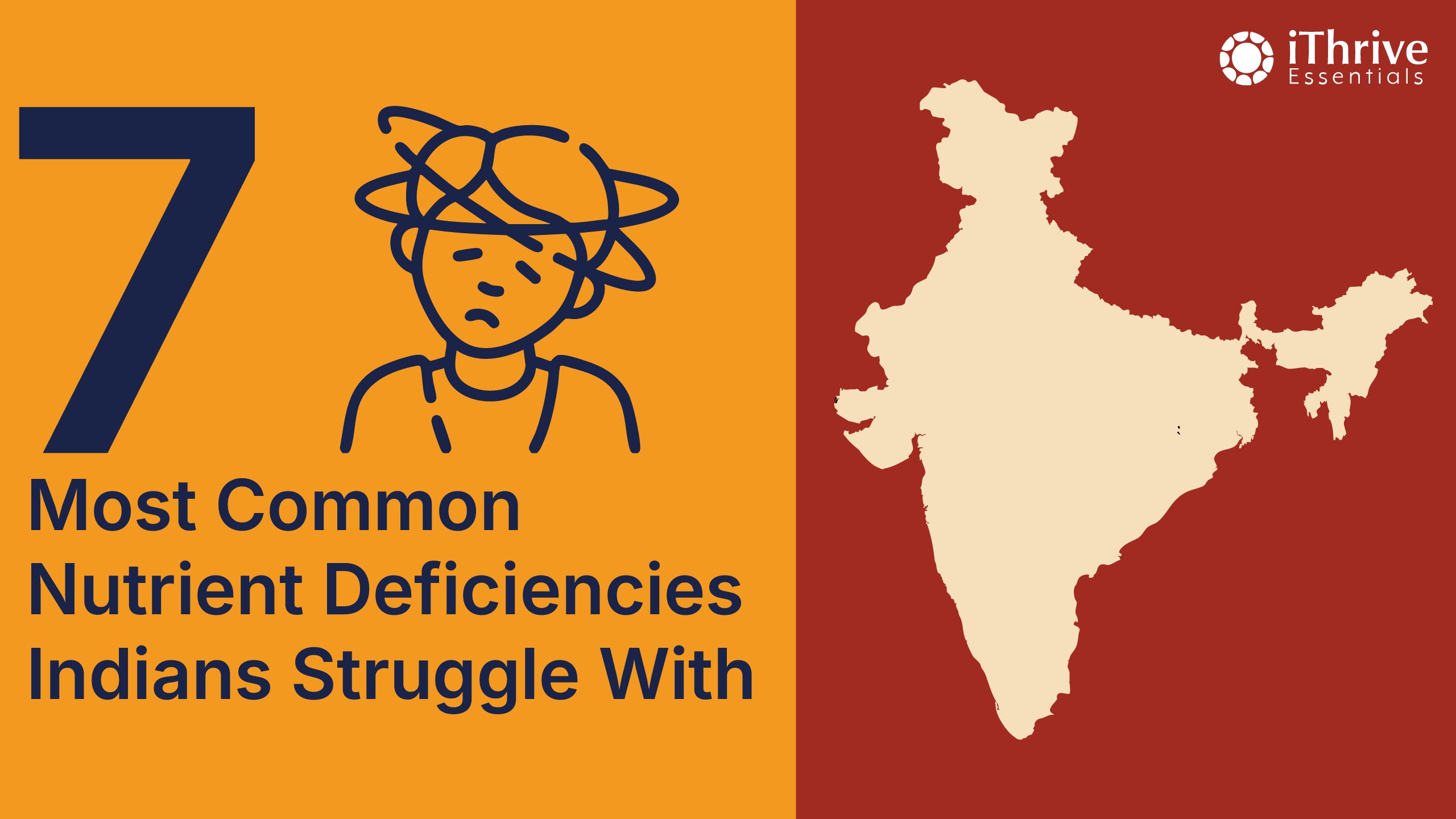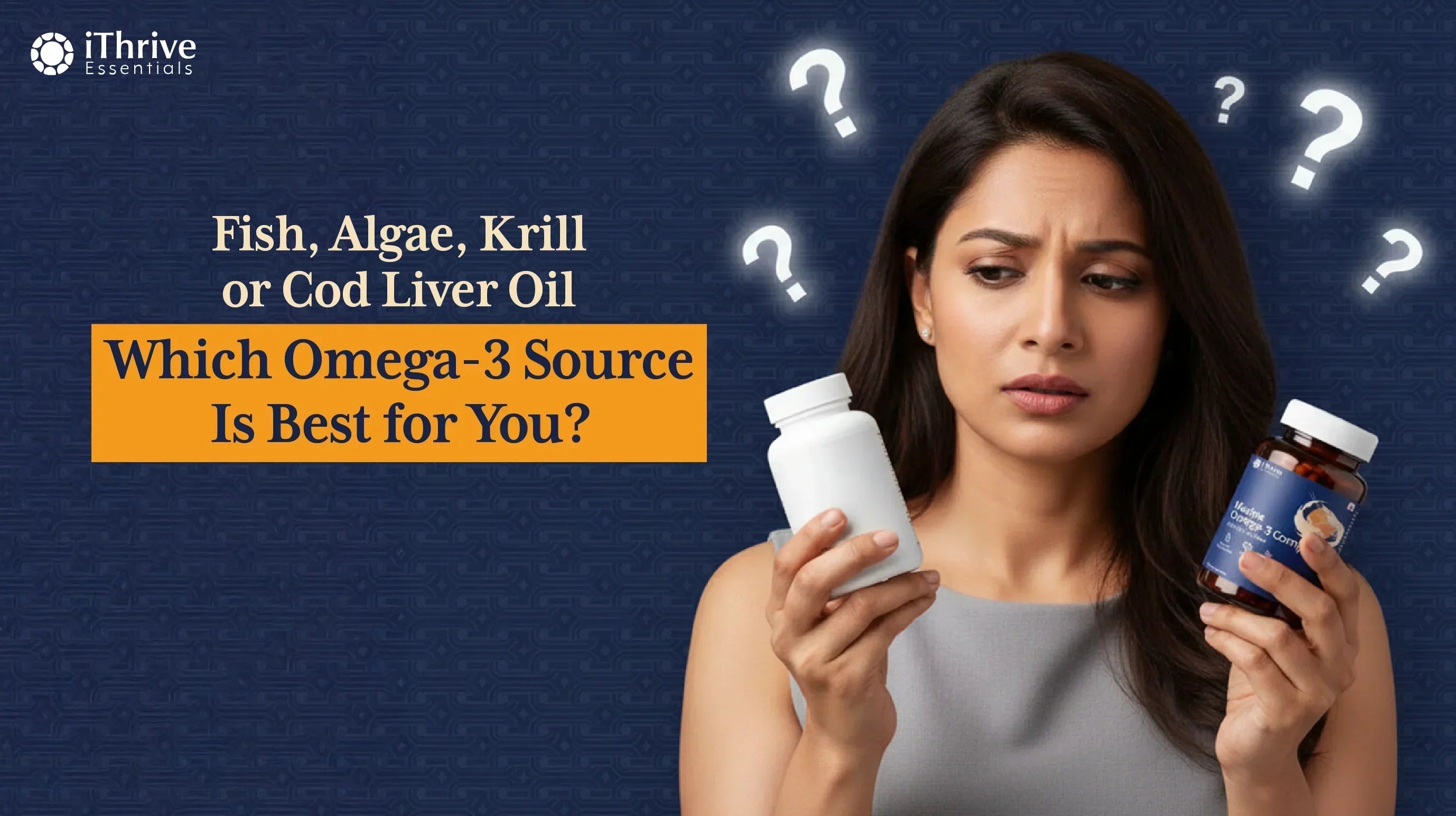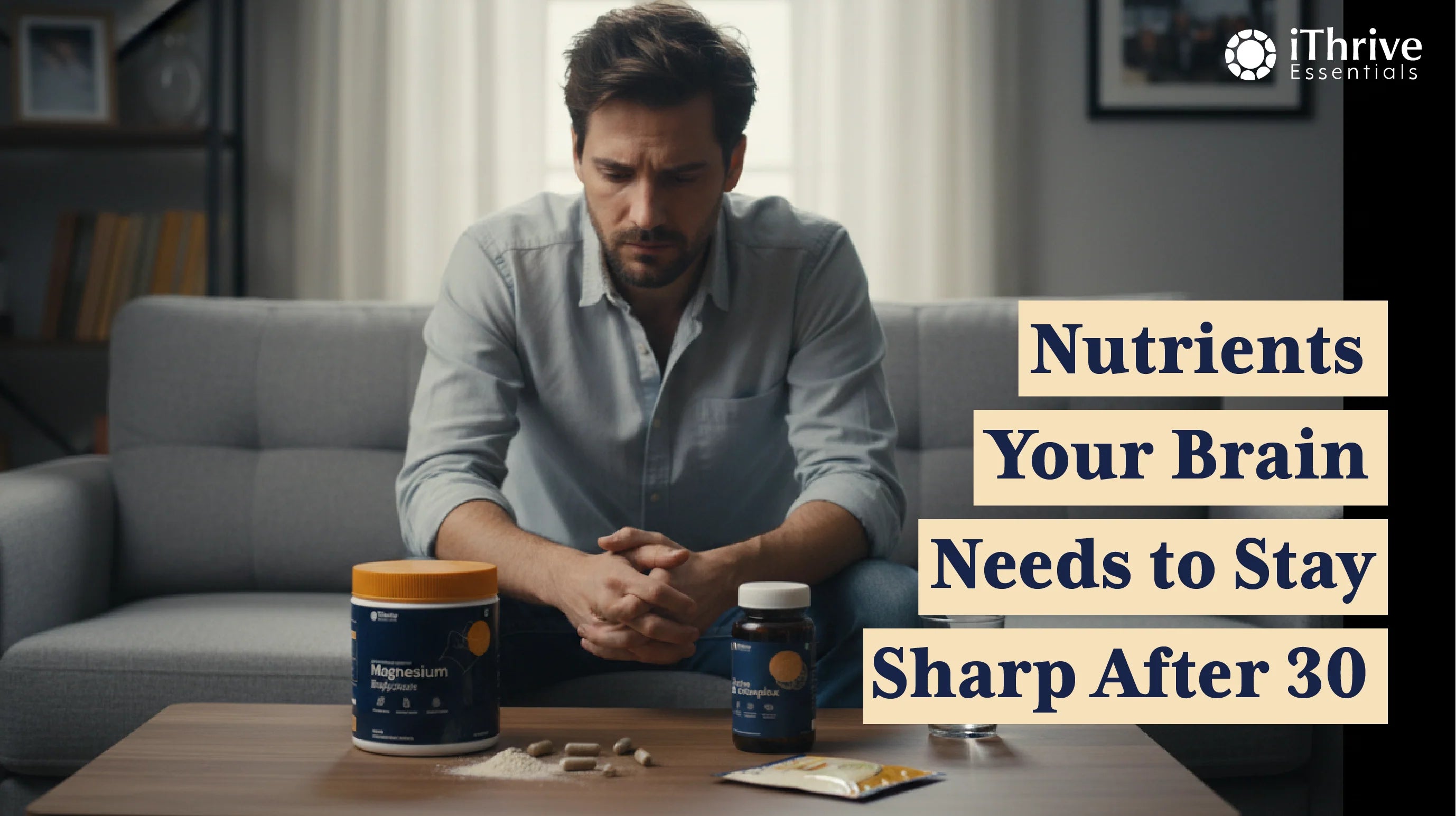
7 Most Common Nutrient Deficiencies Indians Struggle With
Did you know that more than 70% of Indians are deficient in at least one essential nutrient even for those who appear perfectly healthy on the outside? It’s ironic, isn’t it? We live in a country known for its diverse and flavorful cuisines, yet our bodies are silently running low on the nutrients they need most. Our plates are often full, but our cells are starving.
The reasons are many like long working hours indoors, pollution blocking sunlight, over-dependence on refined foods, vegetarian diets without proper supplementation, and even stress that affects how well we absorb nutrients. We might be eating enough calories, but nutritional quality is where we’re falling short.
From chronic fatigue and poor immunity to hair loss and low mood, many common issues we face every day often trace back to simple vitamin or mineral deficiencies that go unnoticed for years.
In this blog, we’ll take a closer look at the five most common nutrient deficiencies Indians struggle with, why they happen, what signs to watch for, and how you can fix them naturally through food, lifestyle changes, and the right supplementation.
Why Are We So Deficient?

You might think that nutrient deficiency happens only when someone eats less food. But that’s not true. Even people who eat three proper meals a day can be low in vitamins and minerals. The problem is not just what we eat, but also how our body absorbs nutrients and how our lifestyle affects it.
Let’s look at a few simple reasons why so many Indians today are deficient:
1. Too Many Processed and Refined Foods
We eat a lot of inflammatory foods, refined flour, bread, biscuits and packaged snacks. These foods fill our stomach but don’t give us real nutrition. They lack essential vitamins and minerals and can even block the absorption of other nutrients.
2. Poor Soil Quality
The fruits and vegetables we eat today don’t have the same nutrient levels they had years ago. Overuse of fertilizers and chemicals has reduced the nutrient content in the soil, so our food naturally has fewer minerals now.
3. Stress and Weak Gut Health
Constant stress, late nights and digestion problems like acidity, gas or bloating affect how well your body absorbs nutrients. Even if you eat healthy food, your body might not be able to use it properly.
4. Lack of Awareness
Most people don’t get their nutrient levels checked until they feel very tired or sick. By that time, the deficiency has already been there for months or years.
Top 7 Deficiencies Affecting Indians Today
Let’s look at the top 7 deficiencies affecting Indians today and how you can fix them naturally.

1. Vitamin D
Vitamin D helps your body absorb calcium, keeps your bones strong, supports your immune system and improves mood. Low levels are linked to fatigue, depression, body aches, and even frequent colds.
India has no shortage of sunlight, yet almost 80% of Indians are Vitamin D deficient. Surprising, right? That’s because most of us spend our days indoors working, studying or traveling in closed spaces. When our skin doesn’t get enough sunlight, it can’t make Vitamin D naturally. Pollution, sunscreen and covered clothing reduce it even further.
Common signs:
- Feeling tired even after resting
- Joint or muscle pain
- Low mood or sadness
- Weak bones or frequent illnesses
How to fix it:
- Get 15–20 minutes of sunlight daily:
Sunlight is the most natural source of Vitamin D. Try to spend time outdoors between 10 AM and 2 PM, when UVB rays are most effective. Even short, consistent exposure on your arms and face can make a big difference.
- Eat Vitamin D-rich foods:
Include eggs, fatty fish like salmon or mackerel and fortified foods in your diet. These help support your Vitamin D intake, especially if you don’t get enough sunlight.
- Take a Vitamin D3 with K2 supplement:
Sometimes, sunlight and diet alone aren’t enough. In that case, try iThrive Essentials Vitamin D3 K2. It combines plant-based Vitamin D3 with patented Vitamin K2 (MK-7) in an MCT oil base.
Know more about why Vitamin D3 K2 is important click here.
2. Vitamin B12
Vitamin B12 is essential for healthy nerves, brain function and red blood cell formation. It also supports your energy levels and mood.
50–60% of Indians have low B12 levels. It’s mainly found in animal foods — eggs, dairy, fish and meat. Excessive alcohol consumption can also lower B12 by damaging the stomach lining.
Common signs:
- Feeling tired or sleepy
- Numbness or tingling in hands and feet
- Memory problems or difficulty focusing
- Low mood or irritability
How to fix it:
- Include B12-rich foods:
Eggs, dairy, fish and chicken are natural sources of B12.
- Keep your gut healthy:
Include probiotic-rich foods like A2 curd, kefir, sauerkraut or take iThrive Essentials Probiotics with Prebiotics.
- Supplementation:
Try iThrive Essentials Active B-Complex — bioavailable forms supporting energy, brain function and metabolism.
Look at how taking B Complex can fix your deficiency in 30 days: click here
3. Iron
Iron helps your body transport oxygen to every cell, giving you energy and keeping your brain sharp. It also supports healthy skin, hair and nails. Iron deficiency is one of the most common health issues in India, especially among women and teenage girls. It’s a major cause of anemia — where your body doesn’t make enough red blood cells to carry oxygen. Low intake of iron-rich foods, heavy menstrual bleeding and consuming tea or coffee right after meals (which blocks absorption) are common causes.
Common signs:
- Constant tiredness or weakness
- Pale skin or dull complexion
- Hair fall and brittle nails
- Dizziness or frequent headaches
How to fix it:
- Eat iron-rich foods:
Add foods like ragi, beetroot, jaggery, organ meats and lentils to your meals.
- Combine with Vitamin C-rich foods:
Vitamin C increases iron absorption. Pair iron sources with lemon, amla, oranges, guava or bell peppers.
- Avoid tea or coffee around meals:
Tannins and caffeine interfere with iron absorption. Avoid them one hour before and after meals.
- Add LP299v probiotic for better absorption:
Lactobacillus plantarum 299v (LP299v) supports iron uptake by improving gut health. Consume fermented yoghurt with LP299v or supplements.
4. Calcium
Calcium supports strong bones and teeth, keeps your heart and nerves functioning properly, and helps muscles contract.
Nearly 90% of adults in India don’t get enough calcium. It’s not just a child’s nutrient. Poor Vitamin D levels and excessive processed foods or soft drinks deplete calcium.
Common signs:
- Muscle cramps or stiffness
- Weak bones or frequent fractures
- Tooth decay or brittle nails
- Fatigue or restlessness
How to fix it:
- Eat calcium-rich foods:
Ragi, sesame seeds, sardines and amaranth seeds are excellent non-dairy sources.
- Maintain good Vitamin D and Magnesium levels:
Calcium needs Vitamin D and Magnesium for absorption. Get morning sunlight and include foods like mushrooms or eggs.
Try iThrive Essentials Vitamin D3 K2. It combines plant-based Vitamin D3 and Vitamin K2 (MK-7) in an MCT oil base. D3 absorbs calcium and K2 directs it to bones instead of arteries.
- Limit soft drinks and processed foods:
They contain phosphorus and sodium that weaken bones. Choose whole foods instead.
5. Magnesium
Magnesium supports muscle relaxation, heart health, blood sugar balance and hormone regulation. It’s called the “relaxation mineral.”
It impacts sleep, mood and stress levels. It’s essential for over 300 functions in the body, yet most people don’t get enough.
Common signs:
- Trouble falling or staying asleep
- Muscle twitches or cramps
- Feeling anxious or restless
- Frequent headaches
How to fix it:
- Eat magnesium-rich foods:
Pumpkin seeds, sunflower seeds, almonds, cashews and dark chocolate support magnesium levels.
- Practice stress management:
Chronic stress depletes magnesium. Try deep breathing, walks, journaling or meditation.
- Supplementation:
Try iThrive Essentials Magnesium Bisglycinate. It’s gentle, highly absorbable and supports sleep, calmness and energy.
How to choose the right magnesium supplement: Read the full blog
6. Omega-3
Omega-3 fatty acids keep your brain sharp, reduce inflammation, support heart health and improve mood and skin. Over 80% of Indians are deficient. Lack of fatty fish and excess refined oils increases inflammation and Omega-3 demand.
Common signs:
- Dry, itchy or inflamed skin
- Low mood or irritability
- Joint pain or stiffness
- Poor memory or focus
- Hormonal imbalances
- Increased inflammation or gut issues
How to fix it:
- Eat Omega-3 rich foods:
Fatty fish (salmon, sardines, mackerel), flaxseeds, chia seeds, walnuts and pasture-raised eggs.
- Take Omega-3 supplements:
Fish oil provides EPA and DHA. Krill oil delivers phospholipid-bound fats and astaxanthin for antioxidant support. iThrive Essentials Marine Omega-3 Complex combines both for better absorption and inflammation control.
- Reduce Omega-6 oils:
Sunflower, soybean, rice bran and safflower oils promote inflammation. Switch to ghee, cold-pressed coconut or mustard oil.
- Support gut health:
Fermented foods and probiotics improve fat absorption.
Confused about how to choose the best Omega-3 supplement? Read now
7. Zinc
Zinc is crucial for immunity, hormones, thyroid balance, skin healing, digestion and brain function. Many Indians are deficient due to low intake of animal-based foods and anti-nutrients in vegetarian diets.
Common signs of deficiency:
- Hair fall or dandruff
- Weak immunity or frequent infections
- Acne or slow wound healing
- Poor digestion or low appetite
- Low testosterone or hormonal issues
- Brain fog or low energy
- Loss of taste or smell
How to fix it:
- Eat zinc-rich foods:
Eggs, seafood, meat and organ meats are highly absorbable. Pumpkin seeds, nuts and legumes contain zinc but also phytates that block absorption.
- Choose the right supplement:
iThrive Essentials Zinc Defense uses zinc glycinate, combined with Copper and L-Carnosine for immunity, hormonal and thyroid support.
- Improve stomach acid:
Low stomach acid reduces zinc absorption.
Support digestion with:
- Lemon water
- Apple cider vinegar (before meals)
- Ginger
- Reducing processed food
Avoid blockers:
Foods high in phytates (wheat, legumes, soy) reduce zinc absorption unless soaked, sprouted or fermented.
Final thought
The next time you feel tired, low on energy or just “not normal,” don’t ignore it — your body might simply be running low on nutrients. Vitamin D, B12, Iron, Calcium, Magnesium, Zinc, Omega-3 — these small things make a big difference in how alive and energetic you feel every day.
Most of us are deficient in more than one of them, but it’s easy to fix. Eat real food, get sunlight, keep your gut healthy and use the right supplements when needed. When your body gets what it needs, your energy, mood, focus — even your glow — fall into place.




Leave a comment
This site is protected by hCaptcha and the hCaptcha Privacy Policy and Terms of Service apply.